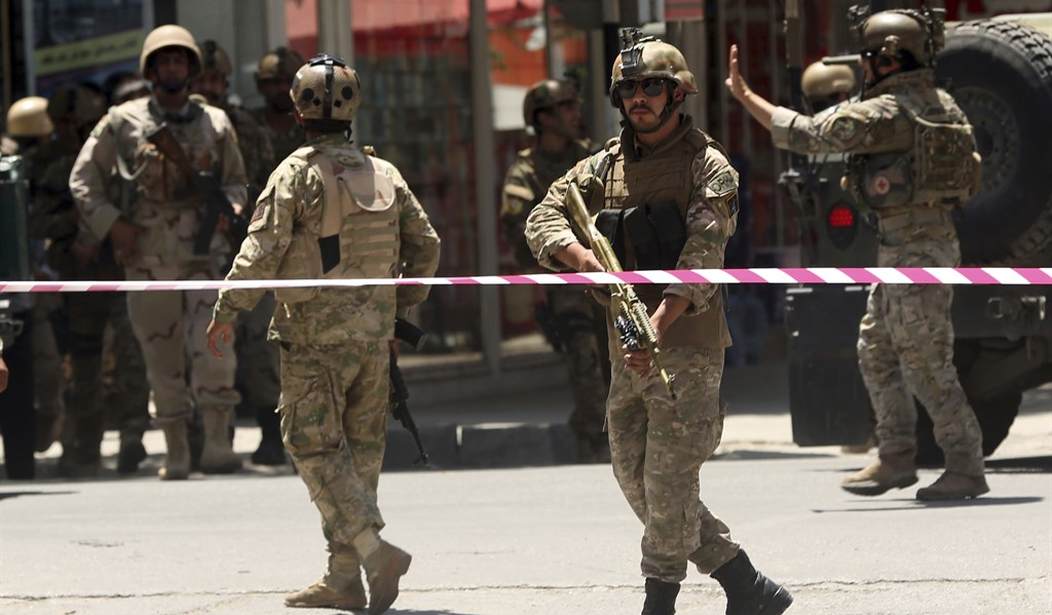“The Americans aren’t just angry. They’re really, really, really angry,” said one Iraqi official after Secretary of State Mike Pompeo informed the Iraqi government that the U.S. was planning a full withdrawal from the U.S. Embassy unless attacks on American personnel and the embassy by pro-Iranian militias ceased.
Pompeo gave the ultimatum to Iraqi President Barham Saleh on Saturday night.
Iranian-backed militias Hezbollah and Kataeb have carried out dozens of attacks on American targets since 2019 while the Iraqi government hasn’t lifted a finger to stop them. Iraqi Prime Minister Mustafa al-Kadhemi, in power since May, has been promising the U.S. he will rein in the militias.
But the pro-Iran faction in the Iraqi government has put up roadblocks to that effort. Now, al-Kadhemi will have no choice but to act.
Ahead of Kadhemi’s visit to Washington in August, the US signalled it was “unsatisfied with his actions” against pro-Iran armed groups, an Iraqi official said.
The US declined to comment on Pompeo’s latest call, but a State Department official told AFP that “Iran-backed groups launching rockets at our embassy are a danger not only to us, but to the Government of Iraq”.
Fresh in the minds of Iraqi officials and armed groups is the US drone strike in January that killed top Iranian general Qasem Soleimani and Abu Mahdi al-Muhandis, the deputy head of Iraq’s state-sponsored Hashed al-Shaabi.
Since then, many of the leaders of Iranian-backed armed groups have gone into hiding — probably in Iran itself or in Syria. But al-Kadhemi has plenty of problems just trying to keep his job without the added burden of cracking down on groups with which many of his own supporters are sympathetic.
The U.S. Embassy in Baghdad is the largest, most expensive embassy in the world and is almost the size of Vatican City. It’s been operating with a much-reduced staff in recent years and dependents have all been sent home. The State Department said it would take 90 days to totally shut down, giving Donald Trump time to reconsider his decision.
Anti-American cleric Moqtada al-Sadr called for a “security committee” to “investigate” the attacks. The subterfuge appeared to work.
Within minutes, Kadhemi and other top government figures endorsed the recommendation.
“There’s a consensus on condemning these attacks. Kataeb Hezbollah and other hardliners are isolated and left without political cover,” an Iraqi official said.
But Iran isn’t standing still. Iranian officials are planning on making life hell for Americans in Iraq regardless of the desires of Iraqi politicians.
A half-dozen previously unheard-of groups have claimed responsibility for rocket attacks on the US and even threatened the United Nations in recent months.
Iraqi intelligence officials and political sources say Iran has been gathering the most hardline among its Iraqi allies into these new formations.
These reconstituted groups see Kadhemi as Washington’s man in Baghdad and are irked by his vows to rein them in.
America’s problem is that while Kadhemi is not exactly in Washington’s pocket, he’s better for U.S. interests than any alternative on the horizon. And an American withdrawal would leave him extremely vulnerable, making his survival in doubt.
The withdrawal would also be a propaganda coup for Iran. But America’s patience with these people is at an end and Trump has probably figured that an Arab-Israeli detente would isolate Tehran so that the Mullahs couldn’t exploit the withdrawal.
That remains to be seen. But as politically painful is it would be for al-Kadhemi to crack down on the militias, it would be worse for him if the U.S. packed up and left.










Join the conversation as a VIP Member